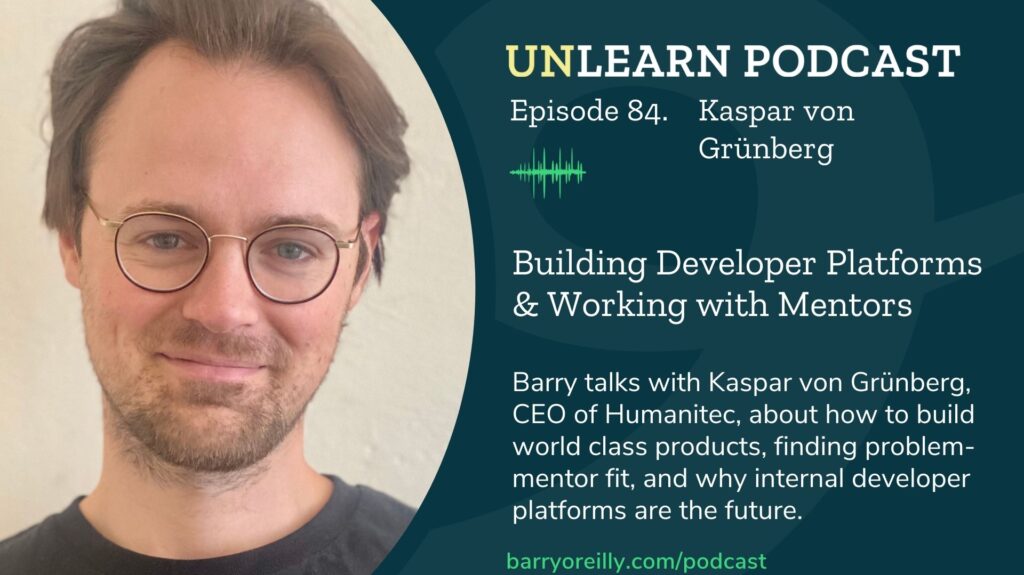Kaspar von Grünberg has extensive experience running software companies. His current role is founder and CEO of Humanitec, a product that enables companies to build internal developer platforms using their Platform Orchestrator. It enables platform engineers to build golden paths that developers love and standardizes app and infra configs by design. In this episode of Unlearn, he and Barry O’Reilly discuss becoming world class. Listen to Building Developer Platforms & Working with Mentors with Kaspar von Grünberg.
Becoming World Class
“I’m telling everybody who works with me: you don’t have to be world class today, but you have to know, ‘What is my relative position to elite status?’” Kaspar believes that everyone can fulfill their highest potential, and that a leader’s job is to facilitate this. His father’s early advice about choosing the right advisors directly influenced his approach to leadership. He tells Barry, “There is a lot you have to learn and you have to learn that really fast.” As such, having the right mentors is crucial. One company in particular shaped how he saw the CEO’s responsibility to his team: they rewarded high-profile mentors with double stock options in exchange for their assistance in specific areas. This taught him the importance of rewarding dedication while motivating his team to achieve more. The CEO has a duty to assist his people in bridging the gap between their current level and elite status, Kaspar remarks. It’s therefore important to seek help when you need it, he says. Barry agrees, “I’ve always been astounded at how helpful people can be if you’re sincere, if you show up and just be yourself, if you say ‘I’m trying to get better at this, can you help me?’” [Listen from 1:45]

Finding problem-mentor fit
Mentorship is a powerful way to bolster your company’s growth, Kaspar and Barry agree. Kaspar’s experience over the years has shown that there’s a correlation between professional maturity and effective problem-solving skills. He also observed that senior and junior personnel approach problem solving differently: senior staff members usually start inquiry with basic questions before delving deeper to find answers to urgent problems. This is the model he wants all his employees to adopt, and mentorship is an effective way to make this happen. That’s why he looks for humility and coachability when hiring new talent. Mentors can identify solutions quickly when they are matched with juniors who share their skill set. “It’s not only about finding the right mentors… but also curating whom you listen to thoroughly and executing this,” says Kaspar. Barry adds that mentor alignment fosters humility because mentors and businesses would both be forced to step aside in the event of a misalignment. [Listen from: 10:20]
“It’s not only about finding the right mentors… but also curating whom you listen to thoroughly and executing this,” —Tweet This
Why Internal Developer Platforms are the future
Kaspar goes on explaining why he is so passionate about platform engineering and enabling engineering organizations to build Internal Developer Platforms. Kaspar’s experience in building software teams from the ground up several times ultimately made him understand that many of the industry challenges had psychological underpinnings. Some of these included monopolizing key projects and domains, which left businesses without knowledge when personnel left, along with concerns with abstraction. His observations were guided by the following questions:
- How can you reduce cognitive load so that developers can actually focus on the business logic?
- How can you design systems that drive standardization by design?
Barry explores how this approach could help Nobody Studios achieve its objective of founding 100 companies and thus applies even outside the realm of software. He intends to use the ‘paved road system’, which is a business strategy that allows for creative deviations. [Listen from 16:50]
(Listen to Personal Board of Directors with Melissa Perri and Gibson Biddle)
Convincing teams of the value of standardization
Kaspar points out that the fear of standardization and abstraction is too often the underlying fear of being “optimized away. He points out that this is ultimately a job of culture and communication to take this fear away. “If you don’t believe that doing something faster will yield 10% more, then you don’t believe in personal growth and in growth of your company,” Kaspar argues. Similarly, he believes leaders should unlearn ideas about abstraction. “Intelligent opaque abstraction that doesn’t go at the expense of context, is actually a good thing for your career,” he points out. This applies to software as it applies to anything else we do. Yet if you standardize and abstract you can never do so at the expense of context. Barry agrees and comments on the unique confidence required to build a system that incorporates the developer’s whole skill set, that would ultimately render the developer redundant.
Kaspar advises to not attach yourself too much to the job and task at hand, the one you are already good at. You cannot define yourself through what you are doing right now but through your potential. You have to constantly reinvent yourself and strive to be a completely different version of yourself in a decade. “This notion of defining yourself by the tools you use you’re going to struggle because technology is going to change, the world is going to change,” Barry remarks.
[Listen from 27:30]
(Listen to The Power of Leading By Example with Cecelia Myers, VP of Digital at CDW)
Looking forward
Kaspar thinks platform engineering is here to stay. Every team with more than 50 developers will have a platform team by 2025. Humanitec’s Platform Orchestrator will be at the core of the Internal Developer Platforms built by these teams. . His ongoing passion is the platform engineering community. “Every single day I have people reaching out and contributing and sharing ideas,” he says. “I hope that is something that continues in the end.” [Listen from 37:55]















